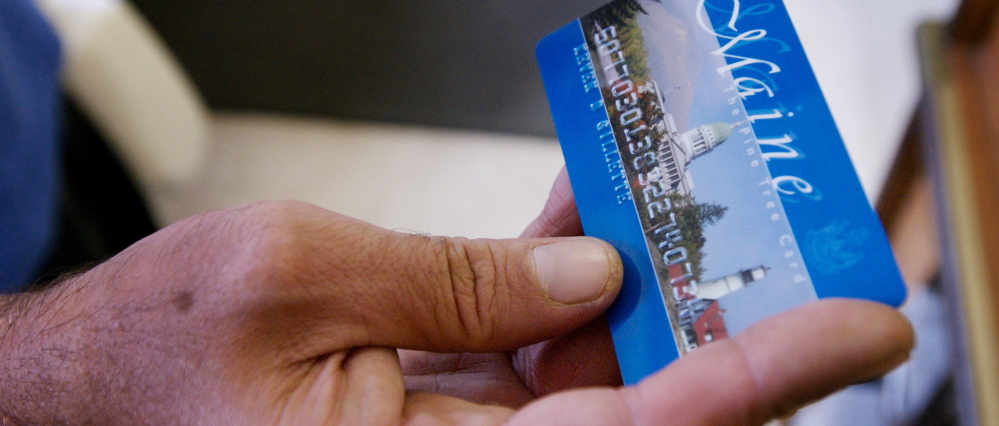The LePage administration’s suggestions for reforming the federal food stamp program, outlined in a letter sent last week to Maine’s Congressional delegation, would help deter fraud. The question is, how would those reforms impact the tens of thousands of Mainers for whom food stamps provide critical support?
As the use of food assistance program slowly contracts from an all-time high of two years ago, the Department of Health and Human Services must make sure that Mainers are leaving the rolls because they no longer need the help, not because the state cut them off unnecessarily.
Many of the reforms in the letter, written by DHHS Commissioner Mary Mayhew, have little or no downside. Limiting the use of food stamps in purchasing junk food, for instance, is in line with the program’s aim of providing nutrition to needy families. As long as the cost of implementation is not too high, it makes sense.
MAKE CARDS EASIER TO TRACK
Likewise the suggestion to restrict the number of replacement electronic benefit transfer cards an individual can request as well as to make it easier to investigate card traffickers and fraudulent retailers. Those reforms can be put in place without harming the recipients who obey the rules.
Not mentioned in Mayhew’s letter but also needing attention are cardholders who are inactive but still receiving benefits, or who are carrying large balances. Both cases are clear waste, and both can easily be tracked and dealt with under current laws and policies.
But DHHS also supports reforms that have been shown to be damaging, not because of their stated intent but how they play out in practice.
Take for example the state’s efforts to place photos on EBT cards, a measure that provides an extra level of security, however thin.
The photos are voluntary, but DHHS has not gone out of its way to make that clear, using language in statements and department literature that make the photos seem mandatory. That confuses both recipients and retailers, and can act as a barrier for people using their legally obtained benefits. The same can be said for reinstating the work requirement, which forces childless, able-bodied people age 18 to 49 to work or volunteer in order to receive benefits.
Again, the impact is small – only 5 percent of food stamp recipients in Maine fit that criteria, and many of them already work – but the aim is proper.
BAD TRACK RECORD
In other states that have reinstated the work requirement, however, food stamp recipients are losing benefits not because they aren’t working, volunteering or receiving training, but because they don’t correctly document those actions. They are technical violations, not ethical or legal ones.
Those policies, the photo IDs and the work requirements, can in the right circumstances keep a recipient from trading a card for drugs, or push a recipient to find work. But they can also keep honest Mainers facing tough times – the vast majority of food stamp recipients – from getting the sustenance they need.
Gov. LePage should recognize that the proposals, however prudent, are aiming to tighten a system that is already remarkably tight, and take steps to make sure legitimate recipients are not unduly harmed. As the administration attempts to, in Mayhew’s words, “ensure the integrity” of the system, it must recognize that includes helping the law-abiding just as much as rooting out the law-breaking.
Send questions/comments to the editors.



Success. Please wait for the page to reload. If the page does not reload within 5 seconds, please refresh the page.
Enter your email and password to access comments.
Hi, to comment on stories you must . This profile is in addition to your subscription and website login.
Already have a commenting profile? .
Invalid username/password.
Please check your email to confirm and complete your registration.
Only subscribers are eligible to post comments. Please subscribe or login first for digital access. Here’s why.
Use the form below to reset your password. When you've submitted your account email, we will send an email with a reset code.